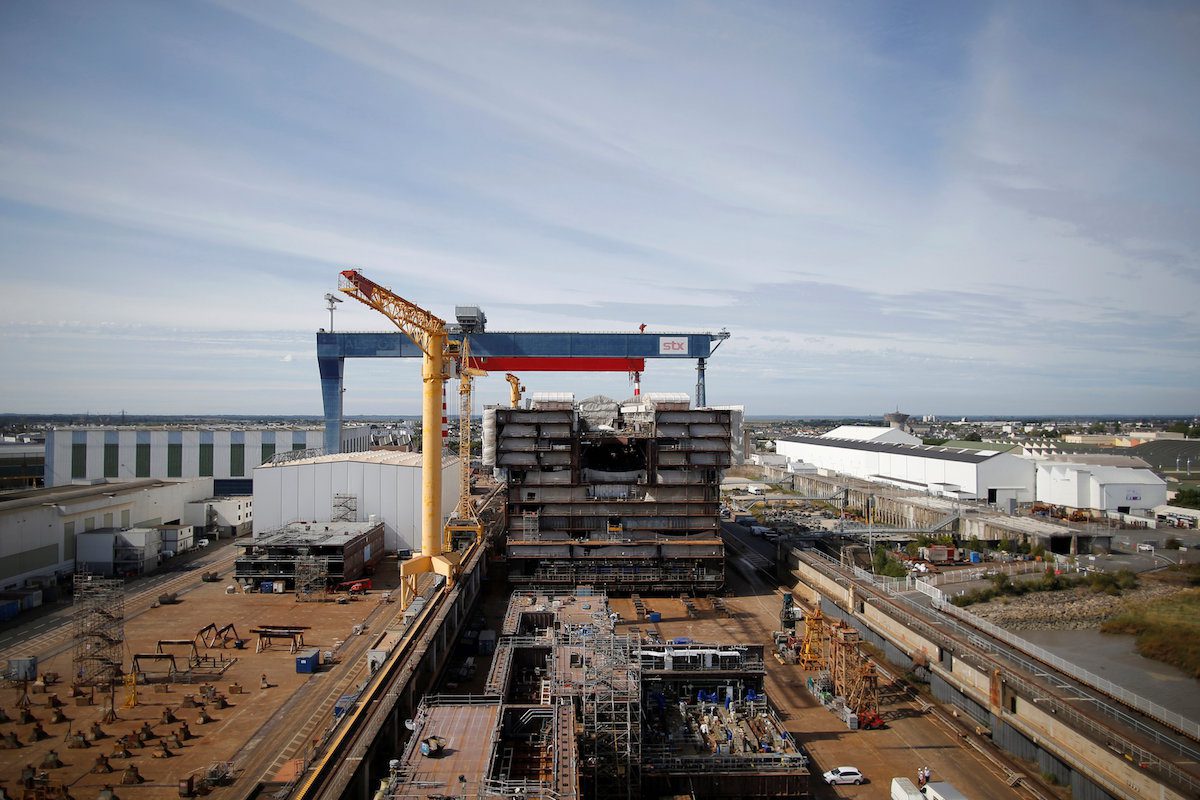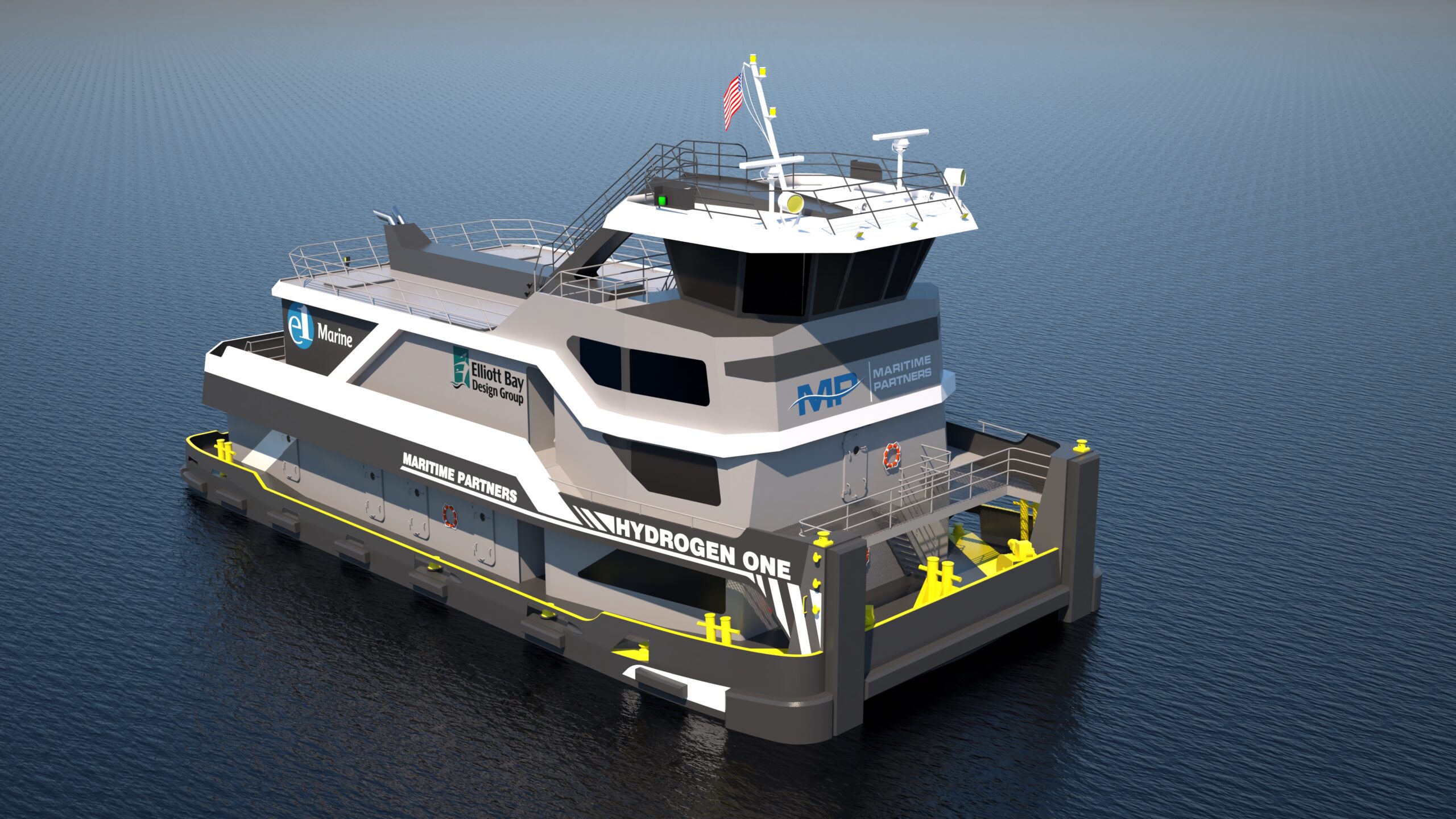File photo shows a section of a cruise ship under construction the STX Les Chantiers de l’Atlantique shipyard site in Saint-Nazaire, France, September 2, 2016. REUTERS/Stephane Mahe
By Gregory Viscusi
(Bloomberg) — The heart of Saint-Nazaire’s economy can be seen from almost anywhere in town: The MSC Meraviglia cruise ship towers over the French port from the STX shipyard where it’s being built. The Korean-owned company’s order books are full for the next decade.
With shipyards and aerospace factories booming from export production, Saint-Nazaire embodies successful globalization. This city on the Loire River estuary to the Atlantic, which has tended to vote for leftist parties, is an unlikely place for the fearmongering message of Marine Le Pen, the far-right National Front presidential candidate.
Yet local National Front officials and the town’s Socialist mayor both expect Le Pen to do better than ever in the city when the French go to the polls April 23 to begin electing their next president. Anger over large numbers of foreign workers at the shipyard, concerns about a looming change of its ownership, disgust with traditional politicians and Le Pen’s general message that France has lost its sovereignty all have taken hold here.
“Saint-Nazaire is hardly a town in crisis. It’s an example of successful industrial renewal,” said Goulven Boudic, a political science professor at the nearby University of Nantes. “But the National Front has turned it into a land of conquest by raising concerns about the shipyard’s future, and by using the argument that foreign workers are taking bread away from French workers.”
Jean-Claude Blanchard, one of three National Front members on the 49-person city council, sits in his basement office in city hall and shows a chart illustrating the party’s upward progression. The Front took just 6.4 percent in Saint-Nazaire in the 2010 regional elections and Le Pen did poorly there in the 2012 presidential vote, getting just 12 percent compared with 18 percent nationally.
Then 2014 local elections saw the Front, known by its French initials of FN, take 13 percent and win city council seats for the first time. The party’s score rose to 18 percent in the 2015 regional elections, while its national tally was 28 percent.
“Industrially, our town has never done better,” said Saint-Nazaire mayor David Samzun, a Socialist like every one of his elected predecessors going back to the 1920s. “But sadly, the FN has risen in every election and I expect them to do better again this time. They feed on fears, on the general malaise in this country.”
He attributed Le Pen’s rise to her message that France shouldn’t be dictated to by the European Union. In Saint-Nazaire, that translates to concern over workers from EU countries at the STX shipyard. Mostly from eastern Europe, they labor under short-term contracts that allow them to be paid what they would get back home, far below French wage levels.
Le Pen wants a clause added to the constitution giving preference to French citizens in jobs and welfare protection. She’s also called for a surtax on companies that hire non-French workers, imposition of import duties and withdrawal from free-trade pacts — including the EU. Polls show she’ll easily take one of the top two spots in the April 23 first round of voting, but will lose the May 7 runoff to independent Emmanuel Macron, who favors EU membership and free trade.
The Saint-Nazaire area, which has about 220,000 inhabitants, has been the French center for passenger-boat construction since the 19th century. The town was totally rebuilt after World War II, when allied aviation pummeled it in attempts to destroy a German submarine base at the port.
After brushes with near collapse in the 1970s and 1980s, the shipyard was reborn as one of only six in the world — all of them in Europe — that make cruise ships. An adjacent Airbus SE factory employs 2,800 people to assemble airplane fuselages that are then sent off to other Airbus factories in France and Germany, which themselves have a 10-year backlog.
Blanchard, a former welder at the shipyard, began his political career as a Trotskyist before shifting to the far right. Crime and Islamic terrorism, major national subjects for Le Pen, aren’t issues in Saint-Nazaire. The town doesn’t have a crime problem and the town’s three mosques blend in with the local community, he said.
But in addition to the concern over foreign workers, the shipyard’s majority owner, Korea’s STX Offshore & Shipbuilding, is in bankruptcy and being forced to sell. The FN has responded by calling for the nationalization of the shipyard, whereas the government is negotiating with the only bidder that’s emerged, rival Fincantieri SpA of Italy.
Blanchard says as many as 40 percent of the 7,000 employees at the shipyard are foreigners working on so-called detached contracts. STX says between 15 and 30 percent of the shipyard’s employees work under that status.
There are an estimated 300,000 detached workers in France, and all five major candidates in the presidential election say they favor tightening the rules to make sure they don’t undercut French wages and standards. The minimum wage in France is about 1,480 euros ($1,582) a month. In Poland, it’s about 450 euros.
“The FN is going to get a good score at the election, that’s for sure,” says Chantal Nuyaouet, tending bar at Le Bresil, a cafe across from the shipyard’s entrance. “All the time I hear the complaint that foreign workers are holding down salaries for the French.”
Pedro, a 43-year-old pipefitter from northern Portugal having an after-work drink with three French colleagues, said he’s worked at refineries, shipyards and dairies in France, Germany and the U.K. over the past five years. He says he’s never felt hostility from his French colleagues, unlike in Britain, but knows there are tensions. The minimum wage in Portugal is 650 euros a month.
Samuel, a 36-year-old French colleague, says he has nothing against the detached workers, but resents the fact that the subcontractor they work for seeks cheap labor from across Europe. He says he’d never vote FN, but hears other workers say they will. Both declined to allow their family names to be used because otherwise they couldn’t speak freely about their employer.
Hiring only French workers might make sense if France produced enough people with the right skills, said Christophe Morel, a 54-year-old delegate of the CFDT labor union. “The FN is rising here because they’ve abused the issue of detached workers to scare people,” he said. “But the problem is that successive French authorities have devalued manual work.”
On Avenue Penhoet leading to the entrance to the shipyards, six interim work agencies all have notices in their windows stamped “Urgent.” They are seeking electricians, industrial painters, welders, pipefitters and boilermakers.
“It’s not an easy problem to fix,” said Pascal Saget, the 56-year-old manager of the local office of Axelis, a Lyon-based temporary-employment firm. “Factories here could never survive without importing workers, but that doesn’t create much of an incentive for a French kid to take up one of those professions.”
The lack of qualified workers means Saint-Nazaire’s unemployment rate of about 8.5 percent, compared with 10 percent nationally, isn’t as low as it should be given all the activity, Samzun, the mayor said. He’s started working with local job centers to provide training, but it takes about four years to produce a qualified worker in most fields.
“Poles, Lithuanians, Romanians, they all come from countries with a serious shipbuilding tradition,” said Morel. “But that’s a point lost on FN voters.”
This is the first in a series of stories on French populism. Click here to read John Follain’s report from Perpignan.
© 2017 Bloomberg L.P

 Join The Club
Join The Club











